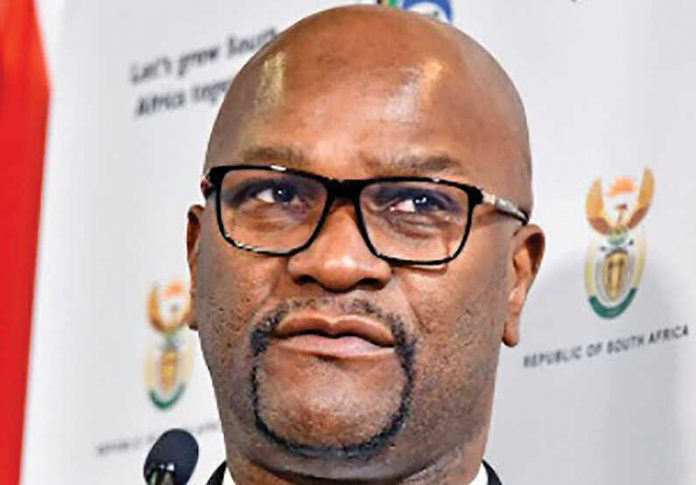A member of parliament and an academic have declared that they will not be mourning the death of Nathi Mthethwa, the former Minister of the Department of Sports, Arts and Culture (DSAC).
Mthethwa, who was the SA ambassador to France, was found dead at the Hyatt Hotel in Porte Maillot, Paris.
According to media reports, the controversial politician was reported missing by his wife on Monday. This was following a concerning message she had received from him.
However, his lifeless body was found outside the hotel. And it is reported that the secure window from his room on the 22nd floor was seemingly forced open.
‘Good riddance’ for some
However, some say they will not mourn his death.
Eugene Mthethwa, an EFF member of parliament, said: “I can’t even mourn his death as an Mthethwa myself. He deprived us and our children of a better life. He betrayed me beyond even my imagination. May his soul not rest eternally. Anyone who betrays the struggle of my sector becomes my enemy,” said Mthethwa on his social media account.
Meanwhile, Ismail Máhomed, a director at the University of KwaZulu-Natal, wrote: “Life goes on. I couldn’t care less. My heart still stays with the families of the Marikana tragedy. The artists who couldn’t get medical attention because a vanity flag was more important than their lives. And the destruction caused through ego, ignorance, and arrogance.
“Not forgetting his personal vendetta against me because I invoked the Protected Disclosures Act to blow a whistle and won a case against the corruption that he aided or shielded in what once was an iconic institution that spoke to the soul of our nation. Another one bites the dust. Hamba Kahle!
“It is ridiculous and disingenuous for government press statements to call a dead man honourable and to claim that he rendered distinguished service to the country when the man’s name has been mentioned several times in the Zondo Commission Report, and once again, his name popped up in the Madlanga commission just days before his death.”
Served during Marikana period
Mthethwa’s political career spanned decades. He served as Minister of Police between 2009 and 2014. During this time, he oversaw the department during one of South Africa’s darkest moments. One was the Marikana massacre of August 2012, where police shot dead 34 striking mineworkers. The incident cemented his reputation as a controversial and divisive figure.
In 2014, former president Jacob Zuma redeployed him to the Department of Sport, Arts and Culture. There, he remained until 2023. But his leadership there quickly became a concern. It became synonymous with controversy, patronage, and strained relations with the creative industry.
He was accused of favouring a small circle of insiders, fuelling widespread resentment. In 2020, Downtown Music Hub’s former board chair, Rudolph Mamabolo, accused him of nepotism in key appointments. By 2021, parts of the arts sector openly demanded his removal. Even though bodies like SAMIC and CCIFSA defended him.
Mthethwa handpicked senior officials and board members across cultural institutions, sparking suspicion of political patronage. In 2022 he was mocked when he proposed to spend R22-million on a national flag. The project was scrapped after public outrage.
Madlanga commission
He also featured in the Madlanga Commission. General Mkhwanazi testified he was forced out of his police role because of Mthethwa’s interference.
Even after leaving office, Mthethwa’s shadow lingered.
A recent Sunday World exposé (September 26) revealed claims that the National Arts Council (NAC) spent over R6-million of taxpayer money to keep arts administrator Tshepo Mashiane out of work. According to the report, Mashiane alleged that Mthethwa personally instructed the NAC to dismiss him. A claim that is supported by former NAC chairperson Princess Celenhle Dlamini in Parliament.
For many artists, activists, and even former comrades, Mthethwa came to symbolise betrayal. Instead of empowering the creative sector, he left it mired in suspicion, factionalism, and wasted opportunities.
His death has therefore sparked little grief. Instead, it has reopened old wounds. A reminder of corruption, nepotism, and neglect in the arts and culture landscape.
DSAC Minister Gayton McKenzie said he met Mthethwa on several occasions as South Africa’s envoy France.
Gayton McKenzie pays tribute
“He was collegial, generous with his time, and deeply insightful in his engagements. Qualities that defined him as a true gentleman and servant of the people,” said McKenzie.
He also praised him for playing a critical role in engaging with the creative industries. For developing mitigation plans to minimise the impact of the Covid-19 pandemic on the sector. And for providing much-needed support to artists and stakeholders during one of the most difficult chapters in our recent history.
“He advanced cultural diplomacy by leading South African delegations to international events. Such as the South African Cultural Season, where he showcased the talent and creativity of our people on the global stage. His efforts in strengthening the creative economy and promoting South African arts and culture domestically and internationally will remain a lasting legacy,” said McKenzie.




